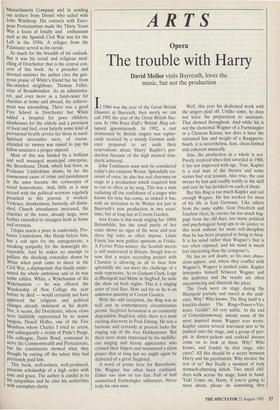Creating utopia in Dorset
Richard 011ard
FIRE FROM HEAVEN: LIFE IN AN ENGLISH TOWN IN THE SEVENTEENTH CENTURY by David Underdown HarperCollins, £17.99, pp. 308 All David Underdown's books, various and original as they are, have concerned themselves with one aspect or another of the Civil War and the Interregnum. This is the first to give us a view of the whole movement of English history from James I to James II, seen, characteristically, from a most unusual and till now unexplored vantage point.
This is the town of Dorchester, hitherto thought of, if thought of at all, as the Casterbridge of Hardy's Wessex novels. David Underdown knows and loves Dorset as Hardy did and does not disdain the lit- erary resonances offered him in his skilful and sensitive delineation of a small society whose petty antagonisms and rivalries yet reflect and exemplify the great conflicts that agitated the nation.
The story opens, as Hardy's novels so often do, with a solitary traveller, a mere speck in the wide Dorset landscape, who describes to us the Fire of the title, the great fire that ravaged Dorchester in 1613. The economic and social shock to the som- nolence of this provincial town, then num- bering about 2,000 inhabitants, opened a psychological opportunity to the remark- able man who dominated the Dorchester of his day, John White, the puritan rector of Holy Trinity and St Peter's, the two chief parishes, from 1605 till his death in 1648.
White was anything but dim and provin- cial. As a fellow of New College he had been a colleague of Lord Saye and Sele (whose role as Cromwell's Parliamentary guru John Adamson has recently estab- lished) and like him was deeply involved in the puritan colonisation of New England. White's nephew, James, was a prosperous Boston merchant and White himself was instrumental in obtaining the charter of the
Massachusetts Company and in sending out settlers from Dorset who sailed with John Winthrop. His contacts with Euro- pean Protestantism made the Thirty Years War a focus of loyalty and enthusiasm such as the Spanish Civil War was for the Left in the 1930s. A refugee from the Palatinate served as his curate.
So much for the breadth of his outlook. But it was his social and religious mod- elling of Dorchester that is the central con- cern of this book. As a preacher and devoted minister the author cites the gen- erous praise of White's friend but far from like-minded neighbour, Thomas Fuller, vicar of Broadwindsor. As an administra- tor, and even more as a fund-raiser for charities at home and abroad, the achieve- ment was astonishing. There was a good Free School in Dorchester but White added a hospital for poor children, almshouses for the elderly and a provision of food and fuel, even latterly some kind of provisional health service for those in need. Spiritual necessities were, of course, attended to: money was raised to pay his fellow ministers a proper stipend.
Most of this was funded by a brilliant and well managed municipal enterprise, the Brewhouse. Drink, which had been, as Professor Underdown shows, by far the commonest cause of crime and punishment in the town became the cornucopia of social benevolence. And, little as it may accord with the political sermons regularly preached in this journal, it worked. Violence, drunkenness, bastardy, all dimin- shed. Church attendances increased, the charities of the town, already large, were further extended to strangers both at home and overseas.
Utopia exacts a price in conformity. Pro- fessor Underdown, like Hardy before him, has a soft spot for the unregenerate, a sneaking sympathy for the downright dis- reputable. And he makes no attempt to palliate the shocking cowardice shown by White when push came to shove in the Civil War, a degringolade that fatally under- mined the whole ambitious and in its way noble edifice. White, a Wykehamist of the Wykehamists — he was offered the Wardenship of New College the year before he died — would certainly not have approved the religious and political changes already imminent at his death. Nor, it seems, did Dorchester, whose views were faithfully represented by its senior burgess, Denzil Holies, one of the Five Members whom Charles I tried to arrest, and subsequently a victim of Pride's Purge. His colleague, Denis Bond, continued to serve the Commonwealth and Protectorate, but his constituents showed what they thought by cutting off the salary they had previously paid him.
This book, well-written, well-produced, presents scholarship of a high order with ease and grace. The author is candid as to his sympathies and he cites his authorities with exemplary clarity.











































 Previous page
Previous page